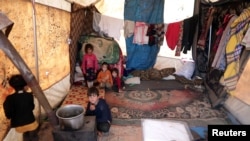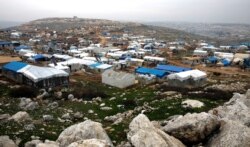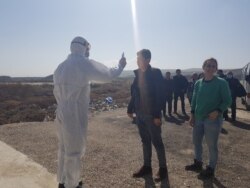Health officials from multiple countries are scrambling to help ensure civilians fleeing from the growing humanitarian catastrophe in northwestern Syria do not fall victim again, this time to coronavirus.
U.N. officials estimate intensified fighting in Syria’s Idlib and Aleppo provinces has forced as many as 948,000 people, mostly women and children, from their homes since early December.
Making matters worse, the conflict has pushed civilians into smaller and smaller areas, with tens of thousands braving cold weather under trees or in the open, while others have taken refuge in unfinished or damaged buildings.
“Any areas with large groups of people, such as camps and cities hosting mass gatherings, are of greater concern,” Inas Hamam, with the World Health Organization’s Cairo office, told VOA.
Haman said the WHO is working with both the United Nations and nongovernmental organizations on a preparedness-and-response plan.
It has also reached out to countries in the region, “so that activities can be scaled up to ensure better surveillance and response capacities,” she said.
But just how much can be done in a short amount of time is a question.
The WHO estimates two-thirds of the countries in the eastern Mediterranean are already coping with some sort of emergency, making it even more difficult for their already fragile health systems to respond.
The situation in northwestern Syria is particularly dire.
New shipments of medicine and other supplies are being sent in, but the number of health facilities is shrinking, with more than 80 shutting down since the start of December.
Some Syrian government officials are also getting specialized training to prepare for coronavirus infections, but efforts in Damascus may have little impact on the crisis-stricken regions to the north.
So far, Syria has yet to report any confirmed cases of coronavirus. But seven cases have been reported in Iraq while almost 400 have been reported in Iran, including at least 34 deaths.
Health workers have been monitoring travelers as they travel from Iraq into Syria. And Syria closed at least one border crossing Thursday, citing concerns about coronavirus.
Some health officials fear it is only a matter of time before the virus strikes Syria, making its way into displaced- persons and refugee camps. And from there, it could make another assault on Europe.
Already, a senior Turkish official has said his country, in response to the Syrian airstrike that killed 33 Turkish soldiers Thursday, will no longer stop Syrian refugees from reaching Europe.
Greek officials, bracing for a wave of refugees from Turkey, tightened security Friday along the country's northern border and increased naval patrols around its islands.
Still, European officials are hopeful they can meet the challenge.
“We are better equipped than ever to deal with any possible events, should they arise,” European Commission spokesman Adalbert Jahnz said Friday, noting resources are being made available to those countries requesting additional help.
There are concerns, though, that the virus could have a larger impact, with ramifications for regional and global security.
U.S. intelligence officials have been keeping a close watch on the spread of the virus, and military officials are likewise taking precautions.
U.S. Central Command this week suspended all leave for U.S. troops in the Middle East and surrounding areas in the hopes of limiting the chances for exposure.
Additionally, troops in Iraq and Syria are being educated about coronavirus and have been instructed to follow guidelines issued by the U.S. Centers for Disease Control and Prevention.
NATO, too, is watching closely, “monitoring any potential impact for NATO troops deployed on operations,” an alliance official told VOA.
“NATO has also taken preventative measures at our headquarters,” the official added. “Precautionary measures include the temporary suspension of some group visits until further notice.”
VOA Middle East Correspondent Heather Murdock contributed to this report.






